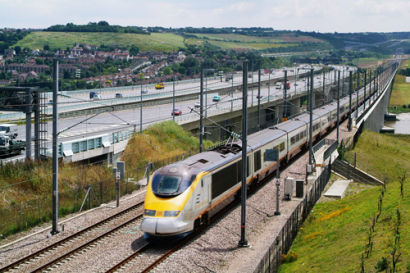ELEVEN of Britain's major cities have joined forces to step up the pressure on the Government to build a network of linking high-speed lines across the country.
Leaders from the cities of Birmingham, Bristol, Cardiff, Edinburgh, Newcastle, Glasgow, Leeds, Liverpool, Manchester, Nottingham and Sheffield are pressing for the ambitious programme.
The 11 cities which have formed the coalition said in a statement released at a high-speed rail summit in London: "The campaign is deliberately focused on the importance of building a whole network to link all our major economic centres together, not simply a sterile debate about where a first route should go."
The call for such an extensive network contrasts with the current Government plans for the development of one high speed north/south line, with the first part of a route running from London to the West Midlands.
High Speed Two Ltd, a company set up by the Government, is drawing up initial high speed route plans to be presented to transport secretary Lord Adonis by Christmas.
Meanwhile, with the high speed debate now in full swing, Network Rail unveiled plans last month for a new £34 billion line for trains travelling at more than 200 mph connecting major cities in the Midlands and North West and later to Scotland.
This would relieve pressure on the West Coast main line which, despite a £9billion upgrade, is likely to be "full up" by 2020.
But the company says a separate high-speed line to Leeds, via Nottingham and Sheffield, would be needed on the east side of the country to "better serve" those cities.
The report has been condemned by regional leaders in the North East who maintain a high-speed linking network is needed to bring economic benefits to that area.
Other reports have attacked the Network Rail proposals as lacking in "detail and common sense" and point to comments made by Lord Adonis that a new high-speed line must link the North East and North Yorkshire to Manchester and Liverpool.
But Network Rail chief executive Iain Coucher has replied to critics saying: "This is a thoughtful piece of research designed to inform us of the options. The decision, in the end, is one for government. It is not a definitive work' this has been done to help inform the public debate on high-speed lines."
During the high-speed summit Conservative shadow transport secretary Theresa Villiers, reiterated her party's pledge that if elected a Conservative Government would go ahead with its plans for a new high speed line to Manchester and Leeds.
But this would be a first step with an aspiration for a line to stretch to Newcastle and Scotland in "years to come."
She said planning would take up to five years with no major spending likely until 2015. The taxpayers contribution would be spread over a construction time of around 12 years.
"Given the lead times involved in building new railways, we can no longer put off the decision on a new line. Within ten years extra capacity on the West Coast corridor will not be a 'nice to have' it will be a pressing necessity."
She added that if high speed rail was well connected to Heathrow it would release thousands of landing slots at what is the nation's busiest and most important airport, making it less overcrowded, more resilient and freeing up space for long haul routes to key business destinations.
"In my view these facts alone leave the case for a third runway holed below the water line," she said.
City leaders call for network of high speed lines
11th September 2009


